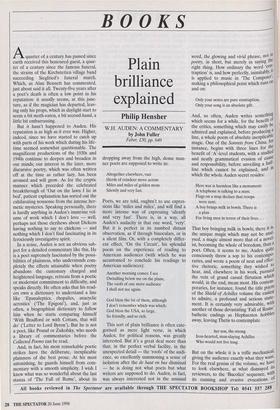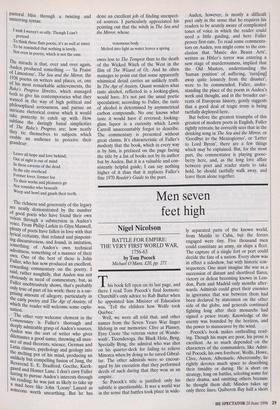BOOKS
Plain brilliance explained
Philip Hensher
W.H. AUDEN: A COMMENTARY by John Fuller Faber, £30, pp. 640 Aquarter of a century has passed since earth received this honoured guest, a quar- ter of a century since the famous funeral, the strains of the Kirchstetten village band succeeding Siegfried's funeral march. Which, as Alan Bennett has commented, just about said it all. Twenty-five years after a poet's death is often a low point in his reputation: it usually seems, at this junc- ture, as if the magician has departed, leav- ing only his props, which in daylight start to seem a bit moth-eaten, a bit second-hand, a little bit embarrassing.
But it hasn't happened to Auden. His reputation is as high as it ever was. Higher, indeed, since we have started to catch up with parts of his work which during his life- time seemed somewhat questionable. The magnificent productions of the 1930s and 1940s continue to deepen and broaden in our minds; our interest in the later, more discursive poetry, which was often written off at the time as rather lazy, has been aroused and will grow. As for the cryptic manner which preceded the celebrated breakthrough of `Out on the lawn I lie in bed', patient explanation has sorted out the exhilarating nonsense from the intense her- metic mysteries. Speaking personally, there is hardly anything in Auden's immense vol- ume of work which I don't love — well, perhaps not those clerihews about Dickens having nothing to say to chickens — and nothing which I don't find fascinating in its ferociously investigative spirit.
In a sense, Auden is not an obvious sub- ject for a detailed commentary like this. He is a poet supremely fascinated by the possi- bilities of plainness, who understands com- pletely the effects attainable when poetry abandons the customary charged and heightened language, retreats from a poetic or modernist commitment to difficulty, and speaks directly. He often asks that his read- ers own a dictionary to understand a line like 'Epanaleptics, rhopalics, anacyclic acrostics' (The Epigoni'), and, just as often, a biographical dictionary to follow him when he starts comparing himself `With Bradford or with Cottam, that will do' Metter to Lord Byron'). But he is not a poet, like Pound or Zukofsky, who needs a library of commentaries before the Collected Poems can be read.
And, in fact, his most remarkable poetic strikes have the deliberate, inexplicable plainness of the best prose. At his most astonishing, he guards himself from com- mentary with a smooth simplicity. I wish I knew what was so wonderful about the last stanza of 'The Fall of Rome', about its dropping away from the high, dense man- ner poets are supposed to write in:
Altogether elsewhere, vast Herds of reindeer move across Miles and miles of golden moss Silently and very fast.
Poets, we are told, oughtn't to use expres- sions like 'miles and miles', and will find a more intense way of expressing 'silently and very fast'. There is, in a way, all Auden's audacity in that one word, 'very'. But it is perfect in its numbed distant observation, as if through binoculars, or in a silent film. Or, with a completely differ- ent effect, 'On the Circuit', his splendid poem on the experience of reading to American audiences (with which he was accustomed to conclude his readings to American audiences):
Another morning comes: I see Dwindling below me on the plane, The roofs of one more audience I shall not see again.
God bless the lot of them, although I don't remember which was which: God bless the USA, so large, So friendly, and so rich.
This sort of plain brilliance is often cate- gorised as mere light verse, in which Auden, for political reasons, was greatly interested. But it's a great deal more than that; in the perfect verbal facility, in the unexpected detail — the 'roofs' of the audi- ence, so excellently summoning a sense of isolation after the de haut en bas dismissal — he is doing not what poets but what writers are supposed to do. Auden, in fact, was always interested not in the unusual word, the glowing and vivid phrase, not In poetry, in short, but merely in saying the right thing. How ordinary the word 'con- traption' is, and how perfectly, inimitably, it is applied to music in The Composer, making a philosophical point which runs on and on:
Only your notes are pure contraption, Only your song is an absolute gift.
And, so often, Auden writes something which seems for a while, for the benefit of the critics, something which may easily be admired and explained, before producing a line, a whole poem of absolute inexplicable magic. One of the Sonnets from China, for instance, begins with three lines for the, benefit of 'A'-level students, with a studied and neatly grammatical evasion of cause and responsibility, before unveiling a half' line which cannot be explained, and 01 which the whole Auden secret resides:
Here war is harmless like a monument: A telephone is talking to a man; Flags on a map declare that troops were sent; A boy brings milk in bowls. There is a plan For living men in terror of their lives. ..
That boy bringing milk in bowls; there it is, the unique magic which may not be anal' ysed, a magic almost more that of a novel- ist, becoming the whole of boredom, than a poet. Often, it seems to me, Auden quite consciously threw a sop to his contemP0" raries, and wrote a poem of neat and effee" tive rhetoric, something they wished t° hear, and, elsewhere in his work, pursued the vein of grand casual flirtation which would, in the end, mean most. His contem- poraries, for instance, found the title poem of the Shield of Achilles volume the easiest to admire, a profound and serious state- ment. It is certainly very admirable, vatli, another of those devastating 'Fall of Rome bathetic endings as Hephaestos hobbles away, leaving Thetis to contemplate
her son, the strong Iron-hearted, man-slaying Achilles Who would not live long.
But on the whole it is a trifle mechanical, giving the audience exactly what they want' For the real genius of the volume, we have to look elsewhere, at what dismayed Its reviewers, to the Tucolics' sequence, with its cunning and evasive evocations of pastoral bliss through a twisting and unnerving syntax: I wish I weren't so silly. Though I can't pretend
To think these flats poetic, it's as well at times To be reminded that nothing is lovely, Not even in poetry, which is not the case.
The miracle is that, over and over again, Auden produced something — 'In Praise of Limestone', The Sea and the Mirror, the 1938 poems on writers and places, or, one of his most remarkable achievements, the Rake's Progress libretto, which managed both to give his contemporaries what they wanted in the way of high political and Philosophical seriousness, and pursue an intricate rhetorical course which it would take posterity to catch up with. How sublime the daringly banal simplicities of The Rake's Progress are; how neatly they tie themselves to subjects which enable an audience to perceive their grandeur: Leave all hope and love behind;
Out of sight is out of mind In these caverns of the dead. In the city overhead Former lover, former foe To their works and pleasures go Nor consider who beneath Weep and howl and gnash their teeth.
The richness and generosity of the legacy are neatly demonstrated by the number of good poets who have found their own voices through a submersion in Auden's voice. From Philip Larkin to Glyn Maxwell, plenty of poets have fallen in love with that lyrical certainty, that relaxed and pinpoint- ing discursiveness, and found, in imitation, something of Auden's own technical adroitness, something of a manner of their Own. One of the best of these is John Fuller, who has now produced an excellent, rewarding commentary on the poetry. I said, rather naughtily, that Auden was not obviously in need of commentary, but, as Fuller unobtrusively shows, that's probably only true of part of his work; there is a sur- Prising amount of allegory, particularly in the early poetry and The Age of Anxiety, of which the reader will welcome some expla- nation.
The other very welcome element in the Commentary is Fuller's thorough and deeply admirable grasp of Auden's sources. Auden was the sort of writer who gives dilettantes a good name, throwing all man- ner of mad theorists, science, German and Latin classics, psychology and geology into the melting pot of his mind, producing an unlikely but compelling fusion of Jung, the Reverend E. E. Bradford, Goethe, Kierk- gaard and Homer Lane. I don't envy Fuller having to pursue Auden's interests through his reading; he was just as likely to take up a mad bore like John 'Loony' Layard as someone worth unearthing. But he has done an excellent job of finding unexpect- ed sources. I particularly appreciated his pointing out that the witch in The Sea and the Mirror, whose
venomous body Melted into light as water leaves a spring
owes less to The Tempest than to the death of the Wicked Witch of the West in the film of The Wizard of Oz. And he often manages to point out that some apparently whimsical detail carries an unlikely truth. In The Age of Anxiety, Quant wonders what taste alcohol, reflected in a looking-glass, would have. It's not just the usual poetic speculation; according to Fuller, the taste of alcohol is determined by asymmetrical carbon compounds. No one knows what taste it would have if reversed; looking- glass liquor is a curiosity which Lewis Carroll unaccountably forgot to describe. The commentary is presented without great claims. It's characteristic of Fuller's modesty that the book, which in every way is by him, is prefaced on the page facing the title by a list of books not by its author but by Auden. But it is a valuable and con- sistently helpful guide; I can say nothing higher of it than that it replaces Fuller's fine 1970 Reader's Guide to the poet. Auden, however, is mostly a difficult poet only in the sense that he requires his readers to be acutely aware of complicated tones of voice in which the reader could need a little guiding, and here Fuller proves first-rate. To read some commenta- tors on Auden, you might come to the con- clusion that 'Musee des Beaux Arts', written as Hitler's terror was entering a new stage of murderousness, implied that the Old Masters, understanding the `human position' of suffering, `turn[ing] away quite leisurely from the disaster', were to be commended; Fuller, under- standing the place of the poem in Auden's work and thought, and in the broader cur- rents of European history, gently suggests that a good deal of tragic irony is being tactfully deployed here.
But before the greatest triumphs of this greatest of modern poets in English, Fuller rightly retreats; he correctly sees that in the drinking song in The Sea and the Mirror, or `Goodbye to the Mezzogiorno', or 'Letter to Lord Byron', there are a few things which may be explained. But, for the most part, the commentator is playing goose- berry here, and, as the long love affair between poet and reader starts to take hold, he should tactfully walk away, and leave them alone together.



























































 Previous page
Previous page